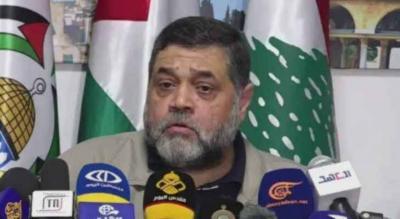Osama Hamdan, a leader in the Hamas movement, confirmed today, Saturday, in a press conference in Beirut that the ceasefire agreement would not have been achieved without the resilience and sacrifices of the Gaza Strip. He expressed the movement's commitment to implementing and ensuring the success of the ceasefire agreement reached through Egyptian and Qatari efforts. However, he criticized the Israeli side for not adhering to the agreement, citing gunfire and provocative practices, as well as the changing of prisoners' names. He stated, "The occupation has not and will not succeed in freeing its captives by force." He continued, "Forcing Israel to release 150 women and child prisoners is a result of the courage of Al-Qassam."
He indicated that "the Al-Aqsa flood has inflicted a strategic defeat on the occupation, and our brigades will continue the operations until liberation." Hamdan reiterated Hamas's firm rejection of any calls for foreign forces to participate in the administration of Gaza under any name. He compared an Israeli officer, a captain, who gifts his two-year-old daughter a "bomb" in Gaza to the practices of resistance fighters with prisoners, especially women and children.
He called for pressure on Israeli forces to release medical personnel, particularly the director of Al-Shifa Hospital, Mohamed Abu Salmiya, who is currently detained for investigation. He welcomed all international efforts aimed at referring the crimes committed in Gaza to the International Criminal Court, emphasizing that half of the number of relief trucks entered Gaza contrary to the agreement: "340 aid trucks entered Gaza since yesterday, of which only 65 reached northern Gaza, which is less than half of what Israel agreed upon." He expressed appreciation to Belgium and Spain for standing by the Palestinian cause, as well as to the resistance in Lebanon and Yemen.




